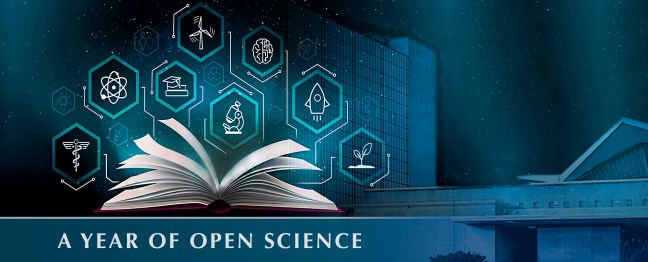Guest post by Lisa Federer, PhD, Acting Director of the Office of Strategic Initiatives, National Library of Medicine (NLM).
In January 2023, the White House Office of Science and Technology Policy (OSTP) announced a federal Year of Open Science. NIH became one of more than a dozen agencies celebrating this Year of Open Science, which is designed to advance open and equitable science and promote access to the results of federally funded research. It has been a big year for NIH so far on the open science policy front with the NIH Data Management and Sharing (DMS) Policy going into effect in January and the announcement of the NIH Plan to Enhance Public Access to the Results of NIH-Supported Research.
What is open science? OSTP defines it as:
… the principle and practice of making research products and processes available to all, while respecting diverse cultures, maintaining security and privacy, and fostering collaborations, reproducibility, and equity.
Those research products can include the data underlying research, the software and code used to access and analyze it, and the articles that report on the findings, among other things.
As you read that list, you might be thinking that providing access to research products and processes sounds a lot like what NLM does—and you’d be right! Although the popularity of the term “open science” is somewhat recent, maintaining and making available the results of biomedical research is at the heart of what NLM has been doing since it was founded nearly 200 years ago. As the world’s largest biomedical library, NLM acts as a crucial resource hub, facilitating access to a vast array of scientific literature, databases, and tools in support of open science.
Providing Open Access to the Literature
In February 2000, NLM launched PubMed Central, an open access repository of full-text biomedical and life sciences journal literature. By making these articles freely available, NLM ensures that researchers worldwide have unrestricted access to critical scientific findings—accelerating the pace of discovery and innovation. This open access helps democratize science by making the results of federally funded research available to all.
Promoting Access to Scientific Research Data
In addition to its literature resources, NLM provides a broad range of genomic data resources through the National Center for Biotechnology Information, ranging from the Sequence Read Archive collection of raw sequencing data, to the GenBank database of publicly available assembled sequences, to the Comparative Genomics Resource which offers content, tools, and interfaces for genomic data resources associated with eukaryotic research organisms. Scientists can not only access data that is crucial to conducting research that helps advance human health, but also submit their own data to enable broader access to the output of federally funded research.
Providing access to scientific literature and data is an important part of NLM’s mission and one of many ways that NLM helps advance open science. If you’d like to learn more about some of the work NLM is doing to support open science, check out How Interoperability Advances Data Sharing and Open Science by Teresa Zayas Cabán, NLM Assistant Director for Policy Development, about NLM’s work on research data interoperability. Over the next few months, some of my other NLM colleagues will also share stories here about how their products and programs help open up science to the broader world.
You may have noticed that I have referred to it as a Year of Open Science and not the Year of Open Science because our efforts toward providing equitable access to scientific research don’t end when the calendar flips to 2024. Open science is a long-term commitment for NLM, central to our mission to serve as a platform for biomedical discovery and data-powered health. As we continue to celebrate this Year of Open Science, how will you help open access to the results of scientific research?

Lisa Federer, PhD
Acting Director, Office of Strategic Initiatives, NLMDr. Federer serves as principal advisor to the NLM Director on strategic directions of NLM, including open science, analysis, evaluation, and reporting on NLM programs and activities. Prior to this position, Dr. Federer served as NLM’s Data Science and Open Science Librarian and previously served as the Research Data Informationist at the NIH Library, where she developed and ran the Library’s Data Services Program. She holds a PhD in information studies from the University of Maryland and a Master of Library and Information Science degree from the University of California, Los Angeles as well as graduate certificates in data science and data visualization.


4 thoughts on “A Year of Open Science, A Lifetime Commitment for NLM”